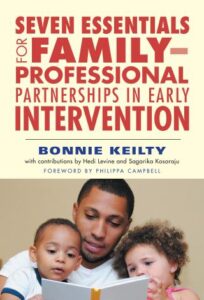Child Outcomes
This topical guide will introduce you to important books, videos, and information resources available from the EI Clearinghouse and other sources. Contact us via online form or by phone (1-877-275-3227) to request a resource listed below (or ask your local public librarian). Note that some videos may be viewed online, and journal titles will take you to the publisher’s homepage.
Table of Contents

EIC Resources
Books
Effective early intervention doesn’t stop when the provider leaves the family’s home. Targeting 80 skills in 6 key developmental domains for children birth to three, this reader-friendly guide gives professionals dozens of ready-to-use ideas for helping families and caregivers embed learning opportunities in their everyday routines.
A proven model for family-centered intervention in natural environments, routines-based intervention is the approach thousands of professionals trust to improve the lives of young children and families. Now there’s a definitive guide to this highly respected, theoretically sound model-straight from the leading authority on routines-based intervention.

This book is about digging deeper and looking closer at what it takes to have successful relationships with each and every family in early intervention practice. Each chapter ends with questions for daily reflection to help early intervention professionals continue to develop their practice.
With a focus on how families and professionals can collaborate effectively so that infants and toddlers learn, grow, and thrive, this book reflects research and best-practices in the field of early intervention. The book includes a chapter on assessment and planning outlining how parents and professionals can work together throughout the process.
This book presents research-based best practices for serving families of children with special needs from birth to age 6. It offers indispensable tools for assessing families, identifying and capitalizing on their strengths, providing information, support, and coaching, collaborating with parents and teachers to address children’s functional needs in the context of everyday routines, and coordinating care.
The articles in this monograph are focused on contemporary assessment practices with particular attention paid to gathering information about young children’s development in authentic and familiar settings such.
- Improving child find through tailored outreach to primary referral sources / Carl J. Dunst, Carol M. Trivette, & Glinda Hill
- Developmental screening in early childhood : potential roadmaps for those considering the journey / Jantine Clifford
- Assessment of family-identified needs through the routines-based interview / R.A. McWilliam
- Using the assessment of family activities and routines to develop embedded programming / Philippa H. Campbell
- Using your good judgment : informed opinion for early intervention / John T. Neisworth & Stephen J. Bagnato
- Using digital video to enhance authentic assessment / Larry Edelman
- Bringing pieces together : assessment of young children’s social-emotional competence / Rosa Milagros Santos
- Evaluating young children who are dual language learners : gathering and interpreting multiple sources of data to make informed decisions / Lillian K Durán, Gregory A. Cheatham, & Rosa Milagros Santos
- Using goal attainment scaling to monitor the developmental progress of young children with disabilities / Laurie A. Dinnebeil, Margie Spino, & William F. McInerney
- Building good assessment into accountability systems for early childhood programs / Kathleen Hebbeler
- Resources within reason : assessment / Camille Catlett.
Videos and Media
Created by the Colorado Dept. of Education, this online video discusses the three general outcome areas for assessing children birth – preschool.
This Apples Magazine shows teams discussing children’s functioning in three outcome areas: 1. having positive social emotional skills, 2. acquiring and using knowledge and skills, and 3. taking appropriate action to meet one’s needs. These are the functional outcomes State Early Intervention and Early Childhood Special Education Preschool Programs must measure and report to the U.S. Department of Education, Office of Special Education Programs. The participant will view three team discussions, each featuring a different child, team, and outcome. All the teams shown on the video include parents. Discussion questions are provided at the end of each outcome discussion to help you think critically about what you have observed.
This video discusses the importance of understanding your child’s strengths, needs, and abilities in order to develop appropriate outcomes for your family.
Organizations
This national technical assistance center supports state early intervention and early childhood special education programs in implementing high-quality programming and enhancing outcomes for young children. The outcomes team of the ECTA Center provides national leadership in assisting states with the implementation of high-quality child and family outcomes measurement for early intervention (EI) and early childhood special education (ECSE) programs.
Articles
This article describes a study that looked at EI outcomes for diverse populations of children served.
This article discusses a study on the impact of services provided under Part C to young children with Autism Spectrum Disorder and their families.
This article describes how participation in activities/routines can be used as a basis for understanding children’s communication and language skills and how that knowledge can be extended to collaborate with families and caregivers to develop meaningful early intervention outcomes.
This article contains strategies to assist early intervention practitioners in understanding how to write family-centered Individualized Family Service Plan (IFSP) outcome statements.
This article discusses the process of monitoring a child’s progress toward achieving goals or outcomes and the importance of making team-based decisions.
Available upon request from the EI Clearinghouse.
Web Resources
Developed by the National Parent Technical Assistance Center at PACER Center, this booklet provides family-friendly information about the Child Outcomes Measurement Process.
The three child outcomes, measured by early intervention and early childhood special education systems, encompass functional skills and behaviors that are meaningful for a child’s participation in everyday routines. They cut across developmental domains to represent the integrated nature of how children develop, learn, and thrive. The breadth of these outcomes provides a framework for describing and consistently measuring children’s functional skills and behaviors across settings and situations.
Included are links to national resources, online training modules, and tools to support teams with outcomes measurement. Also includes some resources related to family outcomes.
The Child Outcomes Summary Process (COSP) is a way for states to summarize data on children for federal reporting purposes. States use the Child Outcomes Summary Form (COSF) to document children’s functioning in three outcome areas. This website offers a variety of tools and resources on the COSP and COSF.
This training package has been developed to provide state and local providers specific information and resources about developing Individualized Family Service Plan (IFSP) outcomes and Individualized Education Plan (IEP) goals. The revised training package includes: an introductory video, a set of six fully scripted PowerPoint presentations, handouts, activities and supplemental materials, and how states have used and adapted the materials.
This paper identifies three science-based design principles that provide a simple way of looking at how public policies and front-line practices can best support children’s development—and the adults who care for them.

